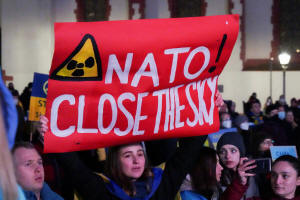Exclusive-Americans broadly support Ukraine no-fly zone, Russia oil ban
-poll
By Jason Lange
 Send a link to a friend
Send a link to a friend
 [March 05, 2022]
WASHINGTON (Reuters) -A broad
bipartisan majority of Americans think the United States should stop
buying Russian oil and gas and work with NATO to set up "no-fly zones"
to protect Ukraine from Russian air strikes, according to a Reuters/Ipsos
poll completed on Friday. [March 05, 2022]
WASHINGTON (Reuters) -A broad
bipartisan majority of Americans think the United States should stop
buying Russian oil and gas and work with NATO to set up "no-fly zones"
to protect Ukraine from Russian air strikes, according to a Reuters/Ipsos
poll completed on Friday.
The poll, conducted Thursday and Friday, suggests that U.S. outrage is
growing over Russia's invasion of Ukraine, which in recent days has
increasingly involved Russian bombing of urban areas.
That puts pressure on U.S. President Joe Biden to take more aggressive
actions against Moscow, although he has dismissed the notion of no-fly
zones because of the risk of open conflict between NATO and Russian
forces.
It was not clear if respondents who supported a no-fly zone were fully
aware of the risk of conflict, and majorities opposed the idea of
sending American troops to Ukraine or conducting air strikes to support
the Ukrainian army.
Some 74% of Americans - including solid majorities of Republicans and
Democrats - said the United States and its allies in the North Atlantic
Treaty Organization should impose a no-fly zone in Ukraine, the poll
found.
An equally bipartisan 80% of Americans said the United States should
stop buying Russian oil. The White House on Friday said it was weighing
cuts to U.S. imports of Russian oil, though it is proceeding cautiously,
concerned about a spike in gasoline prices that would add to high
inflation.

Moreover, 81% of Americans think Washington should impose additional
sanctions on Russia, up from 77% in a Reuters/Ipsos poll conducted on
Monday and Tuesday. Support for more sanctions was also bipartisan.
Some 77% of respondents said the United States should seize the assets
of Russian oligarchs associated with Russian President Vladimir Putin.
Pressure is growing on Biden to ramp up economic pressure on Russia by
targeting its massive exports of oil and gas. Some Western leaders worry
such an approach could trigger a global energy crunch and possibly
escalate the conflict.
[to top of second column]
|

A woman holds a placard as people watch Ukrainian President
Volodymyr Zelenskiy on a screen addressing anti-war demonstrations
in several European cities including Frankfurt, Vienna, Lyon,
Tbilisi, Vilnius and Prague, as Russia's invasion of Ukraine
continues, at the famous city centre Roemerberg, in Frankfurt,
Germany, March 4, 2022. REUTERS/Tim Reichert
 However, some 62% of respondents in
the Reuters/Ipsos poll said paying more for fuel and gas because of
the crisis was worthwhile to defend another democratic country.
"You see increasing willingness among the American
public to pay costs for that support" of Ukraine, said Craig Kafura,
a public opinion expert at the Chicago Council on Global Affairs.
Most respondents in the Reuters/Ipsos poll - 72% - said they
believed the United States should provide Ukraine with weapons.
The United States has pledged to boost weapons shipments to Ukraine,
whose forces have put up more resistance to Russian forces than many
experts initially expected.
Biden has also asked the U.S. Congress to approve an additional $10
billion in military and humanitarian aid for Ukraine.
Some 74% of Americans said their country should take Ukrainian
refugees, a level of support Kafura said was surprising.
Biden's handling of the crisis is getting better marks, with 45%
approval from the public, up from 34% last week. But it is unclear
if this will lift his overall approval rating, which has been below
50% since August.
A separate Reuters/Ipsos poll earlier this week showed Biden's
overall popularity was near the low point of his presidency, a
warning sign for his Democratic Party ahead of the Nov. 8 midterm
congressional elections.
The poll on Ukraine was conducted online and in English throughout
the United States. It gathered responses from 831 adults and has a
credibility interval, a measure of precision, of 4 percentage
points.
(Reporting by Jason Lange; Editing by Scott Malone and Cynthia
Osterman)
[© 2022 Thomson Reuters. All rights
reserved.] This material may not be published,
broadcast, rewritten or redistributed.
Thompson Reuters is solely responsible for this content.
 |